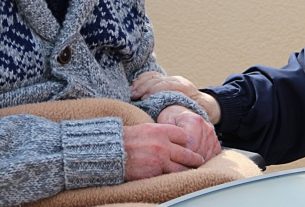In the earliest days, hospice worked under a concept rooted in the idea of offering a place of shelter and rest to weary and sick travelers on a long journey. The concept developed into an interdisciplinary approach providing a comprehensive end of life care in the early 1960s in Great Britain. It didn’t make its way to the United States until the 1970s where that care was modeled to provide care in the patient’s home environment and not in a designated hospice facility.
Hospice care will provide medical services, emotional support and spiritual resources for those who are in the last stages of any terminal illness. The illness is not as important as the stage of the illness and the eminence of death. Hospice will help family members manage some of the practical details of coping with individuals who are experiencing their last days and the emotional challenges of caring for someone who is dying.
The goal of hospice care is to keep the individual comfortable and improve the quality of life they are experiencing while they are dying. There is a large shift in philosophy in the medical care of these individuals from a focus on healing and treatments to a greater focus on improving comfort and decreasing pain.
Some may believe that hospice services are intended to speed up or prolong the dying process but instead the focus is on relieving pain and other symptoms to make the individual more comfortable. Caregivers are really concerned with enhancing the quality of the time remaining by keeping individuals as alert as possible and comfortable in familiar surroundings with friends and family.
To qualify for hospice care the physician must be able to document that an individual is expected to live six months or less. It also means that individuals will no longer receive treatment for their illness but rather receive palliative care. Palliative care is treatment given to relieve the symptoms but not cure the disease. Only the individual and their family and doctor can decide when hospice care should begin.
One of the problems with hospice is that it is often not started soon enough because of resistance from patients, doctors or family members. By beginning hospice care some feel it sends a message of no more future hope. However, if the disease gets better or goes into remission the individual can always be taken out of the hospice program and go back into an active treatment. The hope in the hospice is that it brings about a better quality of life making the best of each day during the last stages of an advanced illness.
Hospice is often set apart from other types of health care by not only the focus but also the way in which that focus is delivered. In most cases, an interdisciplinary team approach will manage the care which means that many disciplines work together to care for the patients. Pain and symptom control are the goals to help individuals achieve a great deal of comfort allowing them to stay in control of their life up until the end. Hospice care also addresses the spiritual needs of the individual and their family and is set up to meet the specific religious beliefs expressed by both the individual and the family members.
Hospice care in the United States is centered in the home but at some point, the individual may need to be admitted to a hospital or an extended care facility. Hospice workers will help to arrange for inpatient care and stay involved in the treatment and with your family. If it becomes suitable again for the individual to return home, hospice care workers will be there to help.
Hospice care is also able to help the family and caregivers receive some respite or time away from intense caregiving. The interdisciplinary team will regularly scheduled family conferences to keep family members and the rest of the team informed about the individual’s condition and what to expect next.
The hospice care team will continue to work with surviving family members through the grieving process and will often provide either a trained volunteer, clergy member or professional counselor to encourage families through visits, phone calls or by suggesting support groups.
Hospice care is a completely volunteer program and utilizes the professional knowledge of healthcare professionals or people who provide services that range from hands-on care to working in the office are doing some fundraising. Hospice care workers will often be the link that many families require in need to provide them with the support, both physical and emotional, to get through this very painful and challenging time.





